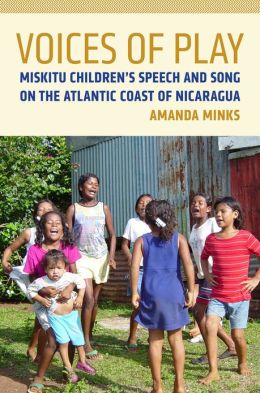Search
User login
CU Alum Amanda Minks Publishes "Voices of Play: Miskitu Children's Speech and Song on the Atlantic Coast of Nicaragua"

The Center congratulates PhD program alumna Prof. Amanda Minks (University of Oklahoma, PhD in Ethnomusicology, 2006), who has just published Voices of Play: Miskitu Children's Speech and Song on the Atlantic Coast of Nicaragua with the University of Arizona Press' First Peoples: New Directions in Indigenous Studies series (2013).
While indigenous languages have become prominent in global political and educational discourses, limited attention has been given to indigenous children's everyday communication. Voices of Play is a study of multilingual play and performance among Miskitu children growing up on Corn Island, part of a multi-ethnic autonomous region on the Atlantic Coast of Nicaragua.
Corn Island is historically home to Afro-Caribbean Creole people, but increasing numbers of Miskitu people began moving there from the mainland during the Contra War, and many Spanish-speaking mestizos from western Nicaragua have also settled there. Miskitu kids on Corn Island often gain some competence speaking Miskitu, Spanish, and Kriol English. As the children of migrants and the first generation of their families to grow up with television, they develop creative forms of expression that combine languages and genres, shaping intercultural senses of belonging.
Voices of Play is the first ethnography to focus on the interaction between music and language in children's discourse. Minks skillfully weaves together Latin American, North American, and European theories of culture and communication, creating a transdisciplinary dialogue that moves across intellectual geographies. Her analysis shows how music and language involve a wide range of communicative resources that create new forms of belonging and enable dialogue across differences. Miskitu children's voices reveal the intertwining of speech and song, the emergence of "self" and "other," and the centrality of aesthetics to social struggle.
Amanda Minks is Associate Professor in the Honors College and is affiliated with the Department of Anthropology and with the programs in Native American Studies and Women’s and Gender Studies at Oklahoma University. She earned the PhD in Ethnomusicology at Columbia University in 2006.
Endorsements:
Subtly nuanced, theoretically sophisticated, and delightfully accessible, this vibrant ethnographic study of Miskitu children's imaginative, multilingual, and intercultural play opens up exciting new perspectives on how indigenous identities persist and change in a globalizing world. Its particular focus on play as the performance and negotiation of children's social positions makes an important contribution to the literature on child socialization in the maintenance of indigenous languages and cultures.
—Jane Freeland, co-editor of Language Rights and Language Survival: A Sociolinguistic and Sociocultural Approach
This book is unique in how it brings together a novel ethnographic focus, ethnomusicology, and linguistic anthropology. Few ethnographies have been written about children in the anthropological literature, and even fewer have focused on children's interactions. Voices of Play provides a detailed look at the everyday exchanges and the play performances of children and adolescents of Miskitu descent who are marginalized in various ways within the Nicaraguan nation-state.
—Barbra A. Meek, author of We are Our Language: An Ethnography of Language Revitalization in a Northern Athabaskan Community
Upcoming Events
No upcoming events available
